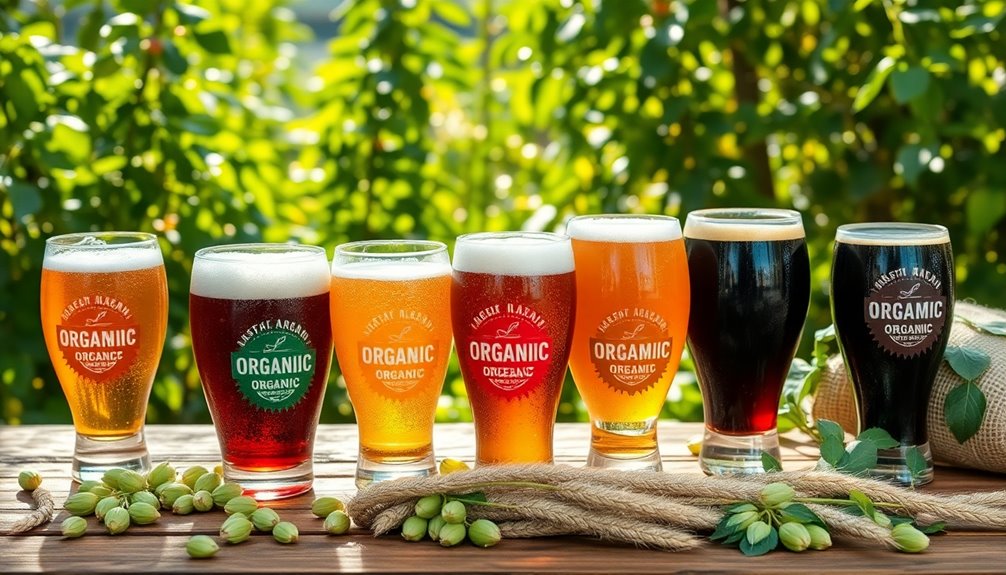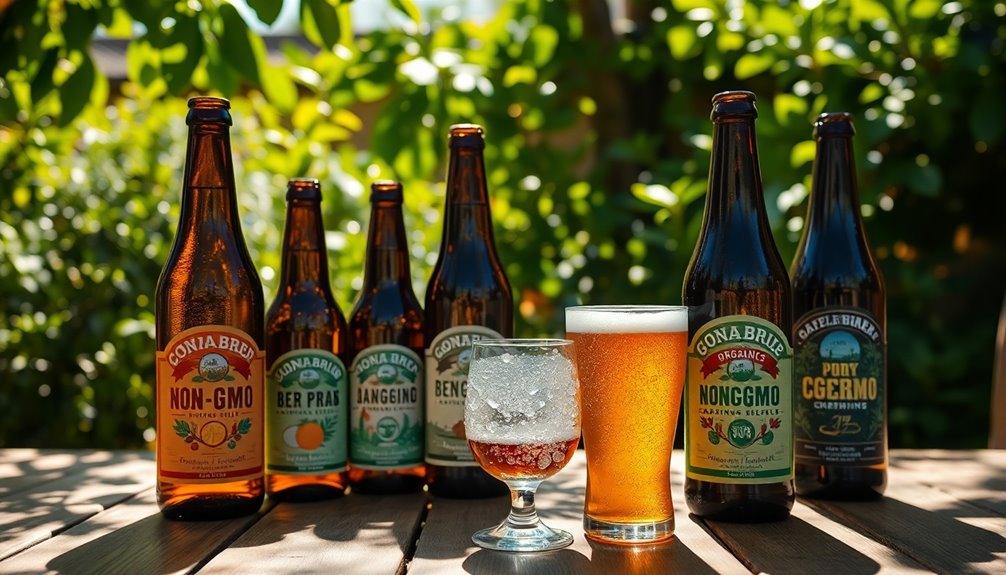If you're looking for non-GMO beers that fit a health-conscious lifestyle, you've got great options. Northcoast Brewing Company offers a variety of Non-GMO Project Verified brews, while Samuel Smith features organic selections from the UK. Dogfish Head's IPAs and stouts use organic ingredients, and Sierra Nevada's flagship IPA is a must-try. Heineken and Amstel Light guarantee non-GMO ingredients too. These beers often come with health benefits like natural probiotics and lower sugar content. By opting for these choices, you support sustainable practices and local economies. Stick around, and you'll uncover even more fantastic non-GMO beer recommendations!
Key Takeaways
- Northcoast Brewing Company offers a diverse selection of 14 Non-GMO Project Verified beers, ensuring quality and health-conscious choices.
- Samuel Smith provides organic, vegan, and non-GMO beers, combining traditional brewing with health-focused ingredients from the UK.
- Dogfish Head features a range of non-GMO IPAs and Stouts made with organic ingredients that align with health-conscious lifestyles.
- Sierra Nevada's flagship IPA and over two dozen other non-GMO options cater to consumers seeking flavorful, sustainable brews.
- Local breweries like Eel River Brewing Company emphasize 100% organic ingredients, supporting regional farmers and promoting sustainability in brewing practices.
Top Non-GMO Beer Brands
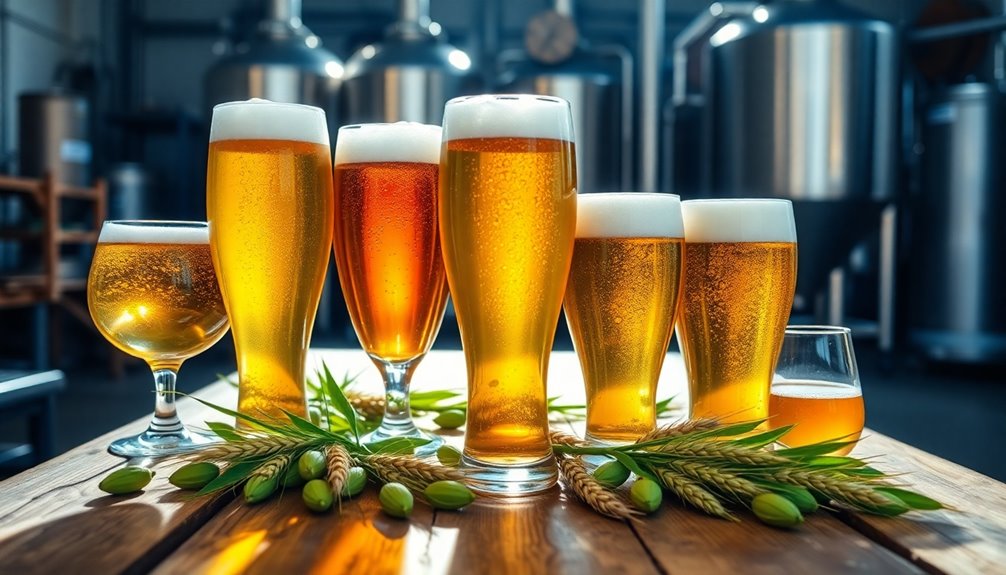
When you're on the hunt for non-GMO beers, you'll find a variety of brands that prioritize quality and transparency. Northcoast Brewing Company stands out with 14 Non-GMO Project Verified beers, including 13 year-round options. Their commitment to non-GMO brewing practices has earned them recognition among health-conscious consumers.
If you're in the mood for something from the UK, Samuel Smith offers organic, vegan, and non-GMO options, while Pinkus provides three varieties from Germany: Hefe-weizen, Munster, and Pilsner.
For something unique, Dogfish Head features non-GMO IPAs and Stouts made with organic ingredients. Mill Street Brewery also shines with over 50% of its brews being organic and non-GMO.
On the larger brewery side, Heineken and Amstel Light ensure all their products are made from non-GMO ingredients. Sierra Nevada follows suit, using only non-GMO sourced materials across its range.
Steam Whistle Brewing offers a GMO-Free Pilsner and an IPA, while Natureland Organic in British Columbia presents over a dozen GMO-free varieties.
With these brands, you can sip confidently, knowing you're choosing quality brews that meet rigorous non-GMO standards.
Health Benefits of Non-GMO Beer

Choosing non-GMO beers not only satisfies your taste buds but also offers several health benefits. These beers often utilize traditional brewing techniques, incorporating natural yeasts that enhance flavor and authenticity.
With the presence of natural probiotics and enzymes, you might find added health advantages, as these elements contribute to gut health and improve digestion. Additionally, many non-GMO beers are crafted with high-quality organic ingredients, which can enhance your overall drinking experience.
By opting for non-GMO beers, you're also supporting locally sourced ingredients. This not only helps local farmers and businesses but ensures fresher, higher-quality components in your brew.
Plus, it minimizes environmental impact by reducing the need for long-distance transportation.
Additionally, non-GMO beers are typically made with sustainably grown ingredients, utilizing organic farming and regenerative agriculture practices.
This focus on sustainability means fewer harmful pesticides and chemicals, creating a cleaner environment for everyone.
Lastly, choosing non-GMO options may lower your risk of exposure to chemicals like glyphosate, which are linked to various health issues.
You could also benefit from higher antioxidant levels, supporting heart and gut health.
Certification and Regulatory Standards
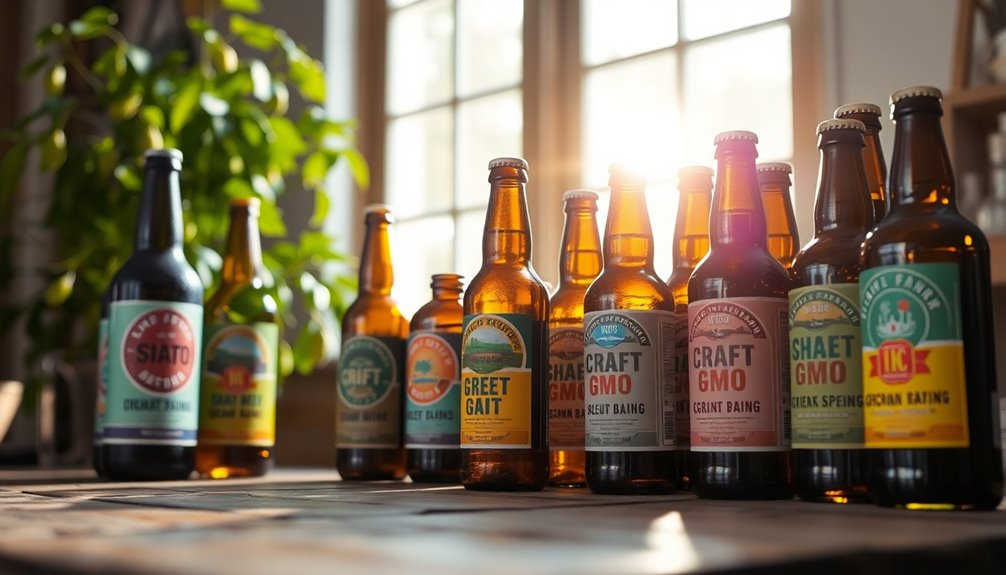
Certification and regulatory standards play a crucial role in ensuring the integrity of non-GMO beers. In the U.S., the USDA Organic Standards are vital, requiring all ingredients to be grown without toxic pesticides or synthetic fertilizers. This means the soil must be chemical-free for at least three years, and genetically modified ingredients are strictly prohibited.
When it comes to certification levels, you'll encounter labels like "100 percent organic," which means the beer is brewed entirely from organically produced ingredients. Alternatively, if a beer is labeled "Organic," it contains at least 95 percent organic ingredients, with the remaining 5 percent needing to be non-organic due to availability issues. Germany has approximately 30 organic breweries today, showcasing the growing popularity of organic beer worldwide.
Each label must comply with TTB regulations and include the organic certifier's name.
Labeling requirements are stringent; the label must undergo the Certificate of Label Approval (COLA) process. To showcase its organic status, the beer must display the USDA organic seal if all criteria are met.
Breweries must also ensure compliance with health, food safety, and labeling regulations, sometimes using third-party lab testing to confirm no detectable GMOs are present, ensuring you enjoy a truly non-GMO brew.
Local and Craft Breweries
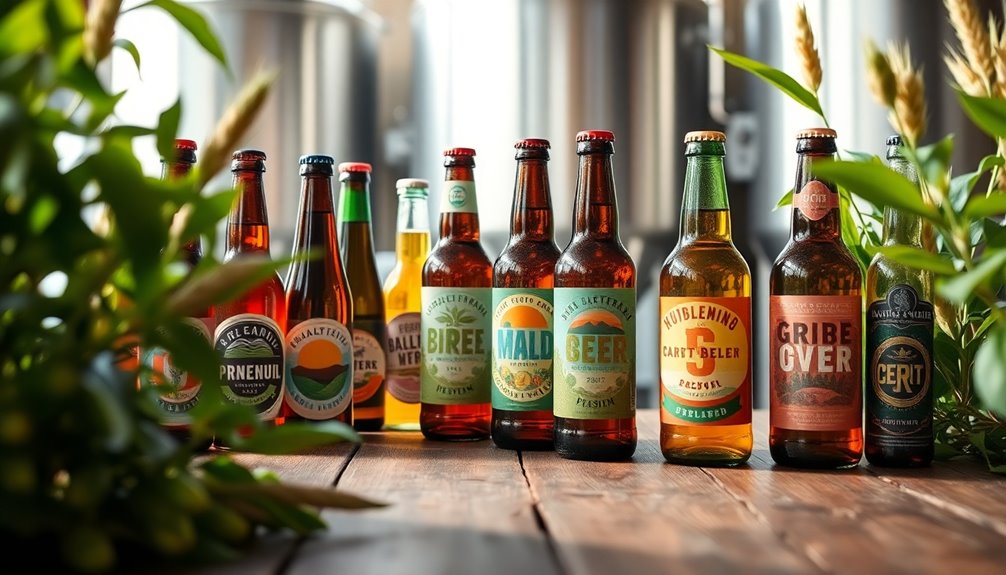
Local and craft breweries are at the forefront of the non-GMO movement, offering consumers a range of options that prioritize quality and sustainability.
These breweries, like North Coast Brewing and Eel River Brewing Company, source ingredients locally, supporting regional farmers and the local economy. By using 100% organic ingredients, Eel River sets a high standard for authenticity and environmental responsibility. Hops historically grown in the area contribute to the unique flavors found in many of these brews, showcasing the rich agricultural heritage of the region.
Anderson Valley Brewing and Maui Brewing Company excel in employing traditional brewing techniques while utilizing innovative practices.
Anderson Valley's commitment to natural processes and Maui's unique ingredients, like coconut and pineapple, highlight the creativity that local breweries bring to the table.
You'll find a diverse array of award-winning beers at these establishments.
North Coast Brewing offers everything from light ales to rich stouts, while Lakefront Brewery impresses with flavors like Riverwest Stein Amber Lager.
These breweries not only produce exceptional beers but also prioritize sustainability.
Many, such as Anderson Valley and Maui Brewing, harness renewable energy and recycling methods, ensuring that their brewing practices are as environmentally friendly as possible.
Choosing local and craft options means you're supporting quality, community, and a healthier planet.
Environmental Impact of Brewing
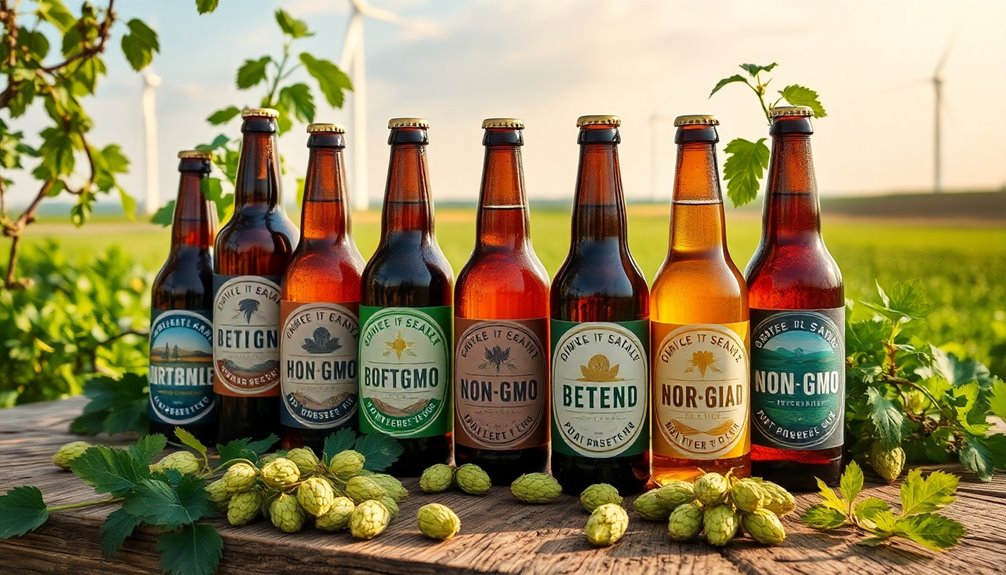
The environmental impact of brewing is significant, often overlooked by consumers who focus mainly on taste and quality. Did you know that beer production requires 5 to 6 gallons of water for every gallon brewed? Most of this water is used in farming, particularly for barley and hops, which can demand 15 to 17 inches of water for growth.
In California alone, craft brewers consume around 651 million gallons of water annually, equivalent to the yearly usage of 12,000 people. Clean beer production emphasizes the use of natural ingredients, which can help reduce the overall environmental impact of brewing.
Energy consumption also plays a crucial role in brewing's environmental footprint. Greenhouse gas emissions from brewery operations stem largely from energy use, with the malting process contributing significantly to these emissions.
Adopting energy-efficient practices can help reduce this impact.
Wastewater management is another concern. Brewing generates effluent rich in organic material, which can pollute freshwater ecosystems.
Implementing on-site treatment facilities or reusing by-products can minimize this risk.
Lastly, sourcing ingredients locally can lower greenhouse gas emissions related to transportation. As climate change threatens barley and hops crops, sustainable practices in brewing become essential for the future of your favorite beers.
Clean vs. Non-GMO Beer
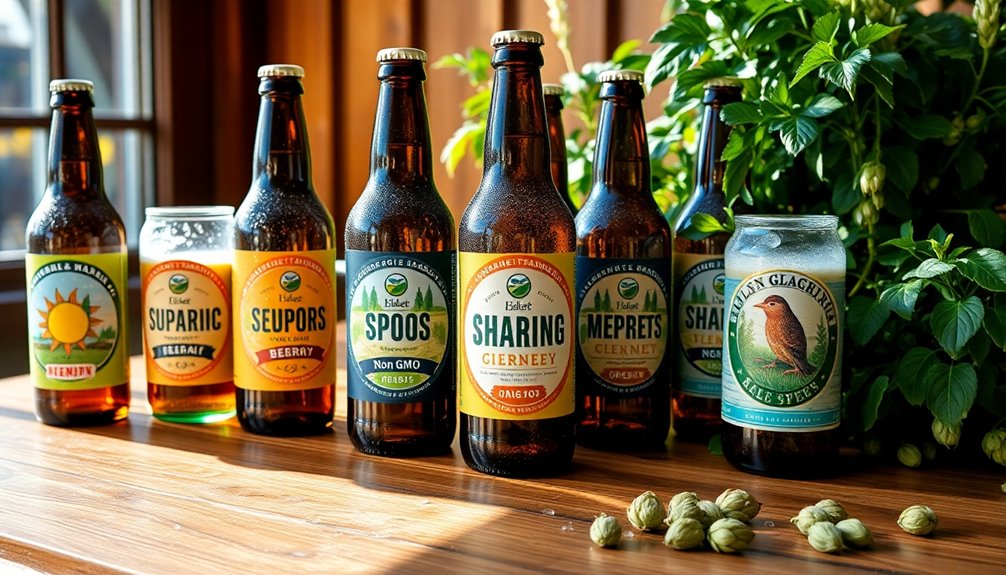
When it comes to choosing between clean and non-GMO beer, you'll find that both options prioritize natural ingredients but cater to different consumer values.
Clean beer focuses on delivering a flawless taste experience, often featuring subdued fermentation flavors and radical transparency in ingredient disclosure. You can expect a refreshing drink that emphasizes pure, uncomplicated flavors. Additionally, clean beer is often associated with subdued fermentation flavors, enhancing its refreshing profile.
On the other hand, non-GMO beer is crafted with ingredients that haven't been genetically modified, aligning with health and environmental concerns. These brews tend to utilize traditional brewing techniques, incorporating natural yeasts and locally sourced ingredients, which support local farmers while reducing environmental impact.
Both types of beer offer health benefits, such as polyphenols that can improve heart health and reduced carbs and sugars that align with health-conscious lifestyles.
However, if you're keen on avoiding GMOs specifically, non-GMO beer is the clear choice. Remember, terms like clean and non-GMO are often used interchangeably, but they reflect distinct brewing philosophies.
Whether you prefer the straightforward approach of clean beer or the traditional roots of non-GMO, you're making a choice that supports natural ingredients and your health.
Recommended Non-GMO Beers to Try
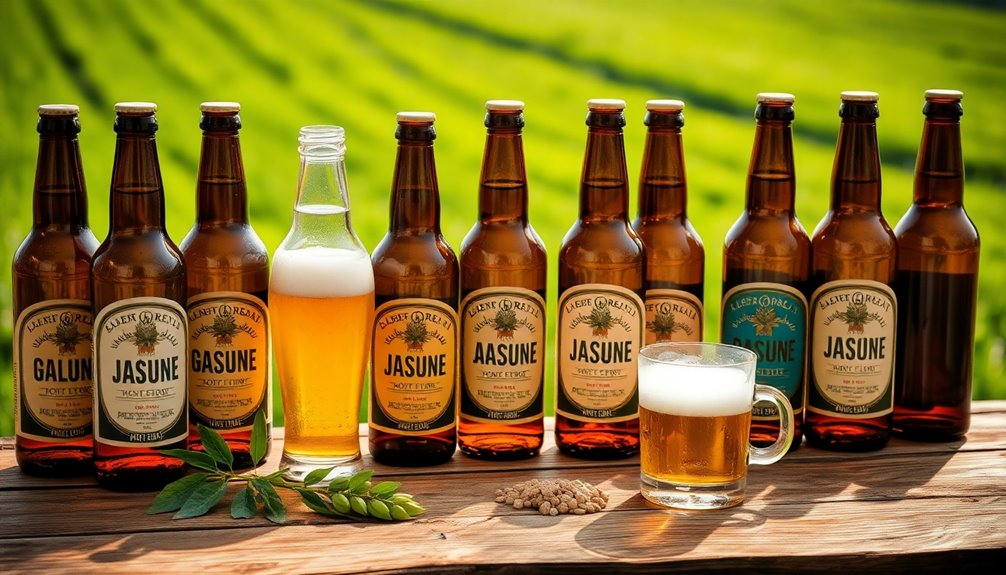
For those looking to explore the world of non-GMO beers, there's a diverse selection waiting to be discovered.
Start with Sierra Nevada, famous for its flagship IPA and over two dozen non-GMO options. If you're into wheat beers, try Northcoast Brewing Company, which boasts a dozen varieties, including fruity blends.
Dogfish Head is another great choice, offering IPAs and stouts crafted from organic ingredients. In recent years, there has been a noticeable shift towards quality in non-alcoholic beer offerings, which reflects a growing consumer preference for flavorful, health-conscious choices.
For an international twist, sample Samuel Smith, a UK brewery renowned for its organic and vegan non-GMO brews. Pinkus, from Germany, provides delightful Hefe-weizen and Pilsner varieties.
If you prefer a classic, Heineken and Amstel Light guarantee non-GMO ingredients across their beers.
Don't overlook Steam Whistle Brewing from Canada, celebrated for its GMO-free Pilsner and IPA.
Lastly, consider Island Brands USA, which focuses on high-quality organic ingredients without artificial additives.
Each of these breweries not only prioritizes your health but also supports sustainable farming practices, making each sip a responsible choice. Enjoy your non-GMO journey!
Frequently Asked Questions
Are Non-Gmo Beers Gluten-Free?
Non-GMO beers aren't automatically gluten-free. While they may use non-GMO ingredients, traditional grains like barley and wheat contain gluten.
To find gluten-free options, you'll need to look for beers made with grains like sorghum or rice. Always check the labels for both non-GMO and gluten-free certifications, as they're separate.
If you enjoy gluten-free beer, consider brands that specifically cater to both dietary needs to ensure a safe choice for you.
How Do I Identify Non-Gmo Beers in Stores?
To identify non-GMO beers in stores, look for the Non-GMO Project Verification label on bottles or cans.
You can also check the brewery's website for certifications and ingredient sourcing.
Opt for beers that feature locally sourced ingredients and natural yeasts.
Pay attention to labels, distinguishing between terms like "clean" and "healthy," as they don't always indicate non-GMO.
If you're unsure, don't hesitate to ask store staff for guidance.
Can Non-Gmo Beer Be Vegan-Friendly?
Yes, non-GMO beer can definitely be vegan-friendly.
You'll want to check the ingredients to ensure there are no animal-derived products used during brewing, like isinglass or gelatin.
Many breweries are now using plant-based alternatives for clarification, making it easier to find beers that meet both standards.
Always look for labels that confirm vegan certification, and don't hesitate to visit the brewery's website for more information on their brewing practices.
What Is the Shelf Life of Non-Gmo Beers?
The shelf life of non-GMO beers generally mirrors that of other craft beers, lasting up to 180 days, depending on the style.
Hoppy varieties tend to have a shorter lifespan, around six months, while darker beers may last a year or longer.
To enjoy optimal flavor, you should consume your beer within four months of the bottled or canned date.
Proper storage in a cool, dark place is essential to maintain quality.
Are There Any Non-Gmo Beer Cocktails?
Yes, there are plenty of non-GMO beer cocktails you can enjoy!
You might try a refreshing Shandy, mixing pilsner beer with lemon juice and ginger.
For something unique, the Birch & Bourbon Smash combines bourbon with birch beer, offering a sweet and spicy kick.
If you like tropical flavors, the Birch Beer and Rum Punch with pineapple juice is a great choice.
These cocktails use natural ingredients, making them a healthier option for your gatherings.
Conclusion
So, if you're looking to sip on something that's both delicious and health-conscious, non-GMO beers are a fantastic choice. With a variety of options from top brands and local breweries, you can enjoy a brew that aligns with your values. Plus, knowing the health benefits and environmental impacts makes each sip even more satisfying. Grab a few of our recommended non-GMO beers and raise your glass to better choices for your body and the planet! Cheers!
